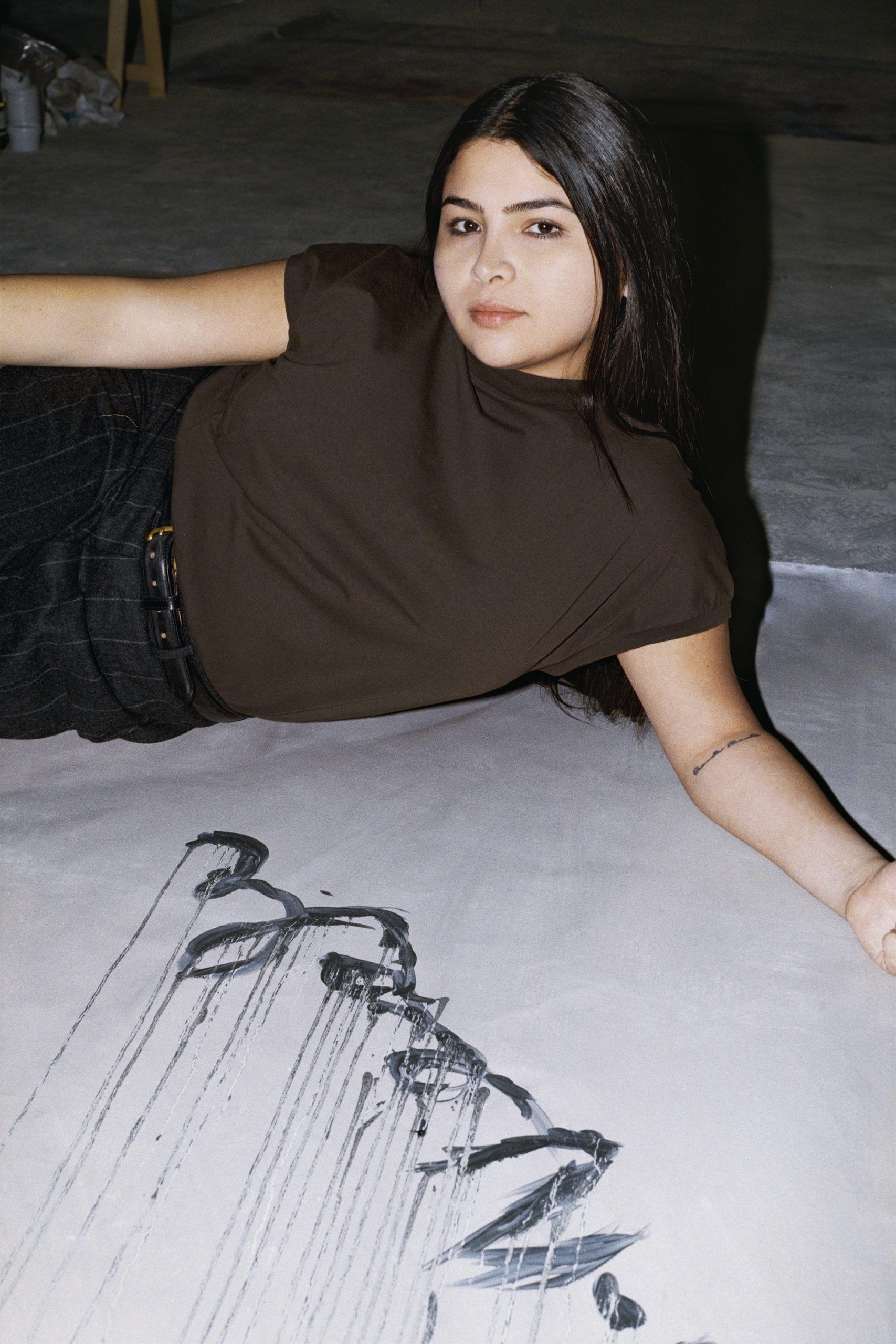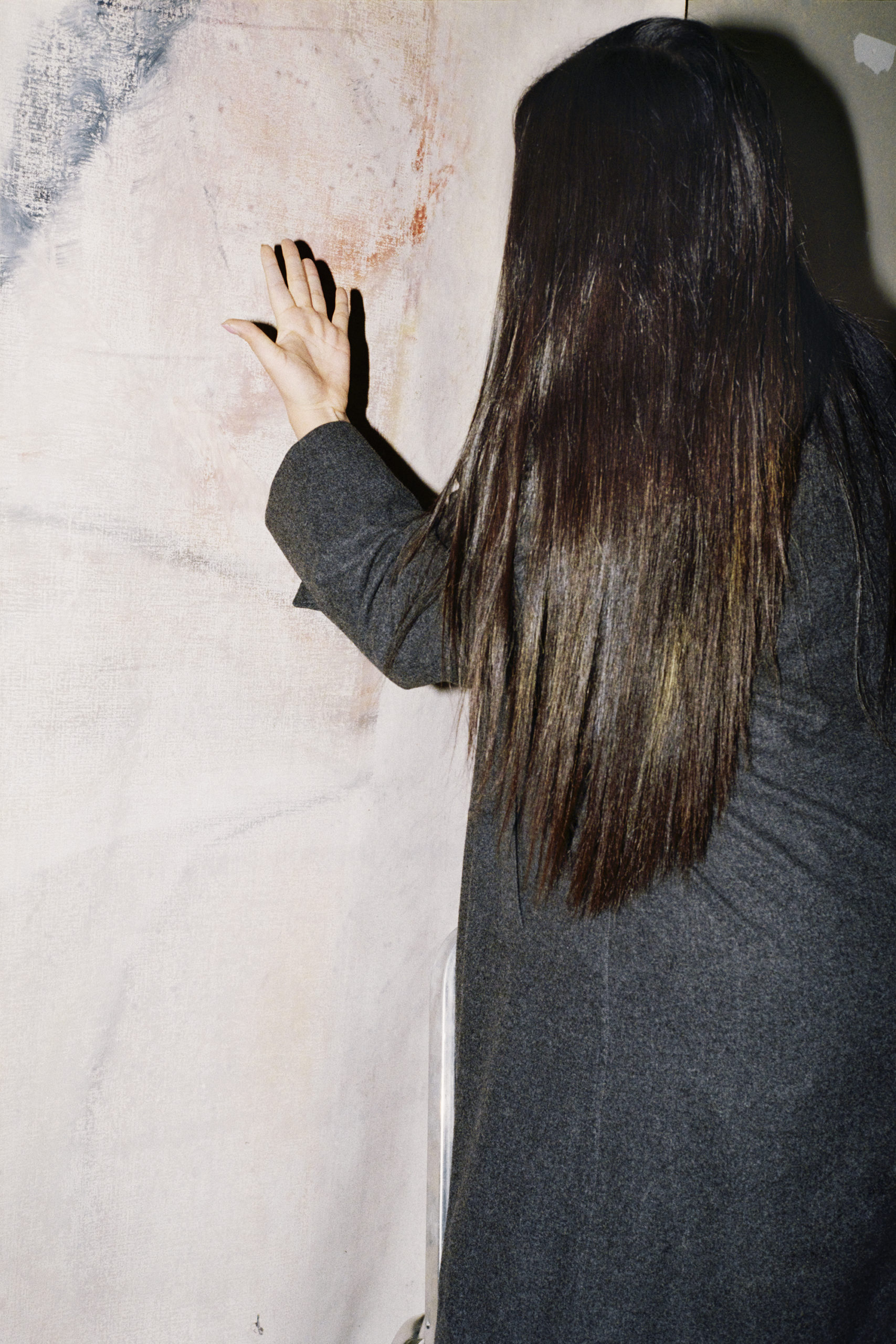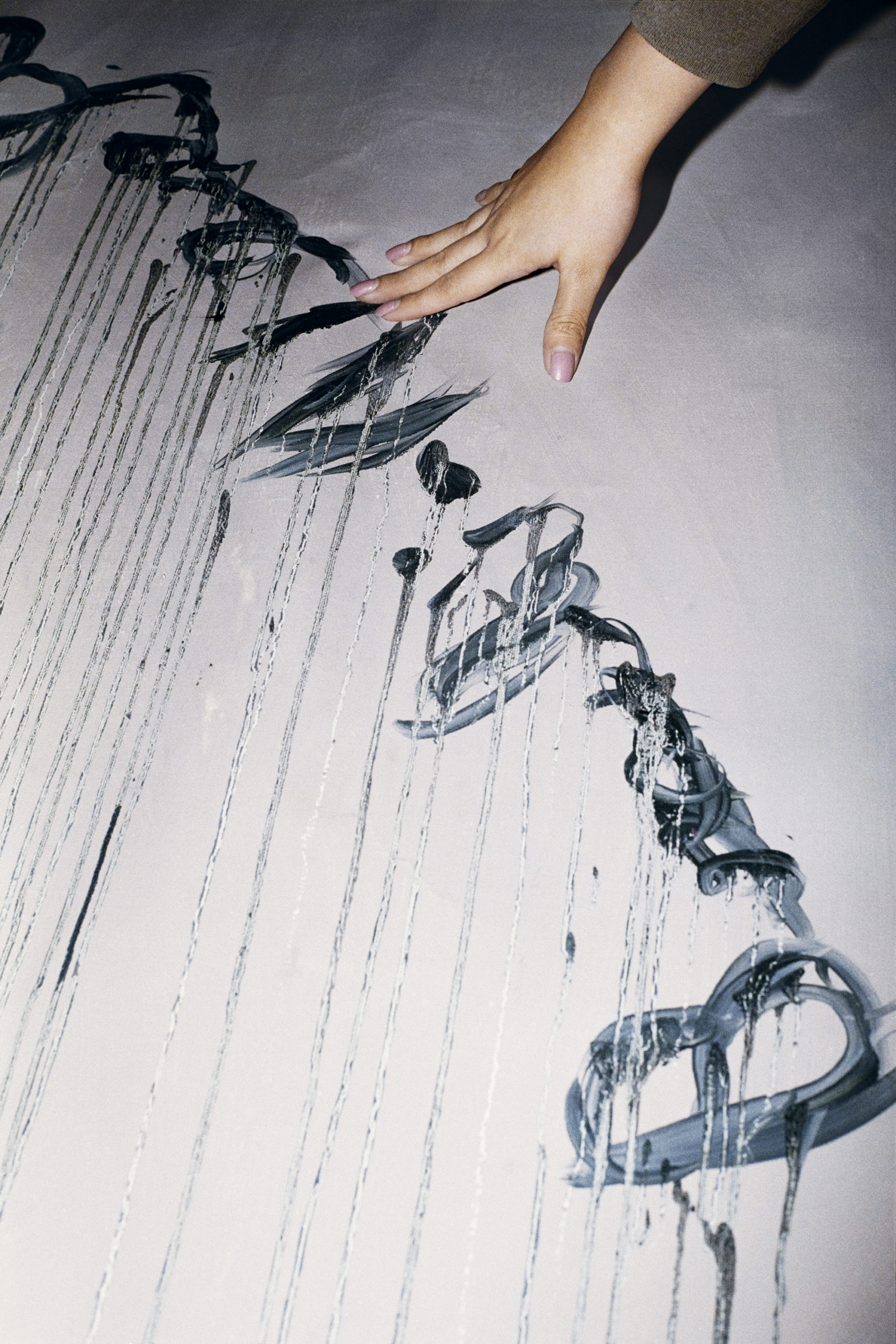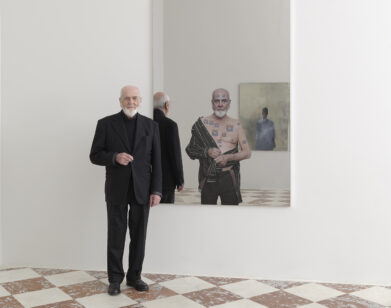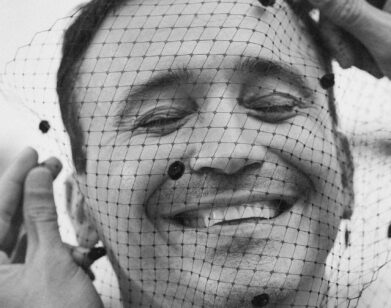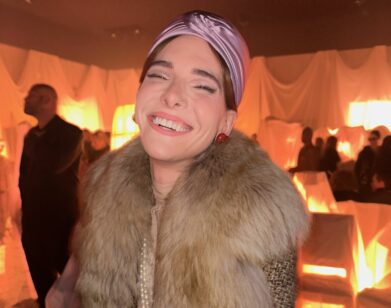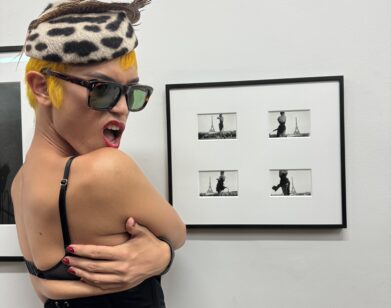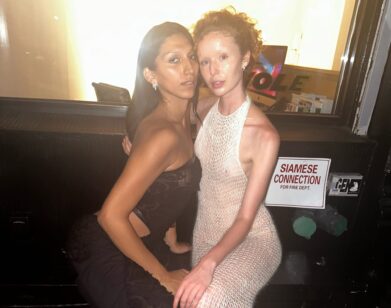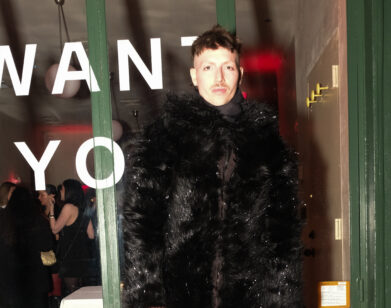ART
Ser Serpas Tells Hari Nef Why She’s Ready to Come Home
MONDAY 7 PM DEC. 4, 2022 PARIS
Ser Serpas, one of the most exciting and ineffable artists of this new generation, has been on the move for a while now. Born in Los Angeles, she headed to New York for college, but not before contacting the performer Hari Nef to find out what living in the city was like. After graduating from Columbia, she hung around refining her art practice, and then jumped continents in 2019, first to Switzerland, then to Tbilisi, Georgia, and most recently to Paris. That’s where she reunited with Hari over Zoom for a conversation about work-life balance and why it really does matter where you stand on the globe.
———
SER SERPAS: Hi Hari!
HARI NEF: Hi! The last time we talked, you said you were in major work mode. Where are you right now?
SERPAS: I’m just back from dinner. I had a poached-egg foie-gras thing, which is crazy and fab. Winter in Paris is not so bad, but it’s already chilly here, and so is my studio. I’m working in a really big space. It’s the size of a mini-mall. I’ve been doing painting, sculpture, and taking photographs of a friend. So yeah, I’m kind of throwing a lot of things into this new show. It’s definitely new territory—at least with the photography work.
NEF: Your painting and sculpture practice are already well established, but this summer I had the privilege of witnessing a reading of a screenplay you started. Now you’re branching into photography. What leads you to all these different media?
SERPAS: I guess I’m trying to work with other people. When I first latched onto art-making, which was at the end of college, I saw it as a solitary thing. I met all these studio artists in New York that were basically like, “I’m in my studio and that’s where I’m going to be for the next month.” And for me, figuring out what I wanted to do was a very solitary practice. Then this last year I got sick of having to isolate myself in order to work. I thought, “Why don’t I work with people I already know?” One of the first ideas I had was this photo project, which is an attempt to bring the sculpture into these private performances, where I move erratically around the room and dance with this junk to music, usually after a Red Bull or two. [Laughs] It’s a private choreography, and the aim of the script you mentioned was to one day bring it to life as an indie film with a team of people who have different expertise. I think Martine Syms beat me to the punch on that idea, but I’m hoping to get around to it. There are a lot of fab artists making films now. It’s good to have a project that brings you into contact with people.
NEF: I don’t think you’re the only creative person who, at this point, feels compelled to commune instead of retreat. I’ve had my own back and forth on this, having written so much last year and having not written a thing this year, because my focus has shifted to acting. I feel like writing has its own hyper-specific rewards and challenges that I can’t get anywhere else. I also think that I’m naturally more gifted at writing than acting. I just find the process of it to be, at this point, non-negotiably lonely and solitary, and also non-negotiable on fun. And I know you and I both like to have fun. I do feel like this is a big shift for you, though. I observed your practice several years ago where I felt like you were retreating a bit, moving away to Europe, taking yourself out of the context where you came of age. You also seemed to have a new kind of seriousness about your work. I wonder how you feel about this shift, not only about the social aspect, but about showing in New York again?
SERPAS: When I went to Europe I was feeling lonely and out of sorts in New York. I feel like a lot of people in our group, we’re all talented, but also privy to bouts of feeling isolated. So I was like, “I’m just going to have some seclusion in Switzerland.” And then I went even farther east to Tbilisi, Georgia. It was like a self-imposed exile. But I did feel invited to Europe at that time in terms of people wanting to engage with me in a way that felt comfortable. When I first moved to New York, it would be expected that I’d talk about myself as a trans person, or as an immigrant, or as a low-income person. That’s kind of all I could talk about and engage with. I was nestled by a lot of our mutual friends and felt supported, but it got into my head. It got to the point that I needed to totally decontextualize myself. I reached a place where I actually saw very little reflection of myself. I had these nights at raves where at some point my friends are just going to start speaking Swiss German or Georgian or French or whatever, and I’d go off to have my own little adventure and explore the darkroom. But I’m definitely homesick at this point, and I think a shift in the work now is out of that homesickness. I’m tapping into that and inspired by what my friends are up to. The photo work is inspired by fashion shoots. And the screenplay came out of my past, too. So I feel a nostalgia for home, now that I can finally see my future a little more.
NEF: And what do you see in your future?
SERPAS: I want to be traveling forever, but I also want a place back in what I think is still the most inspiring city for artistic production for Americans of our generation. I’m obviously very happy to be in Paris, it’s been a fab few months, but this winter is hitting me like a ton of bricks.
NEF: Are you scared to come back to New York?
SERPAS: A bit. It’s not that I haven’t had a real life here, but moving around has allowed me to leave when things get too heavy. Also artistically, it’s lent itself to me having to explore new media on my feet and new ways of working, depending on the studio space I have access to and the materials I have access to during various moves. But I think going back will lend itself to more research, focus, and longer process-based art.
NEF: Is work the most important thing in your life?
SERPAS: That’s also another problem that I’m hoping to fix by moving back to New York. At the end of the day, it’s not so easy to access the little things that aren’t so little when you don’t have so much access to them. Like trans health care and other services, especially when you’re moving around. I have my social life and my really close friends, but I haven’t pursued other things in my personal life these last few years. And work’s definitely been what’s kept me in line.
NEF: Do you feel like you get out of your work everything you put into it?
SERPAS: I get at least 50 percent, which I think is more than a lot of people can ask for.
NEF: I envy you, because you always sit in the driver’s seat of what you produce. I don’t feel like I can rely on work to give me everything that I put into it. It doesn’t hinder me from frequently putting everything I have into it when the time calls for it—and the time has been calling for it. But I struggle with this back and forth that you explore as well, of retreating and focusing on work, and then returning, and then reorienting toward community. I’m wondering, do you foresee a lifetime of going back and forth or do you think that the two extremes can be synthesized into something balanced?
SERPAS: I think there’s a third thing on the horizon, but it might not be so balanced. I do think with contemporary art in its current conception, once you have the backing of a certain level of the market, it’s one of the few jobs where you can make it up as you go along, which is a privilege afforded to very few. Galleries aren’t corporations, and there’s no union. At least not for most of us. It’s so up in the air.
NEF: How are you organizing this new work for the Swiss Institute show?
SERPAS: A lot of artists that I respect have these really theory-laden backings for the work that they’re producing. It takes them a year to make an amazing project, and so much goes into it. And I found a bit of impostor syndrome in how quickly it takes me to put together a large body of work. I’m finally understanding that I’m taking more of an auto-fiction approach to what I’m doing and letting live reactions to a variety of layered experiences do the talking for me. But that’s what most contemporary writers do. Poets especially.
NEF: It sounds like you’re really putting yourself back into the work. I think with age and experience, particularly the experiences that you and I have shared, there arrives a new capacity to listen and go outside of ourselves. That’s what’s exciting about this collaborative aspect of your work. It shows a vulnerability that is exciting for an audience.
SERPAS: Absolutely.
NEF: A friend of mine recently said that she’s not a big fan of vulnerability and doesn’t really practice it. I thought, how refreshing that is, in this age of vulnerability as a point blank social value. But still, it’s hard to render yourself vulnerable in a world that seems to have decided your vulnerability for you for as long as you can remember.
SERPAS: Yes, it’s a scary thing. I just hope to keep running into the right people.
———
Hair: Sayaka Otama using Oribe at Walter Schupfer Management
Makeup: Yvane Rocher using Dr. Barbara Sturm at Walter Schupfer Management
Post-Production: Nittygritty Berlin

